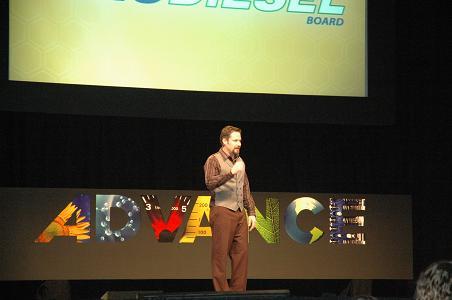National Biodiesel Conference opens with optimism



Photo: Ron Kotrba, Biodiesel Magazine
February 7, 2011
BY Erin Krueger
Approximately 1,200 members of the biodiesel industry convened in Phoenix for the 8th annual National Biodiesel Conference & Expo. While the past two years presented numerous challenges, the overwhelmingly positive atmosphere at this year’s event clearly shows biodiesel producers have overcome those obstacles and are forging ahead into the future.
National Biodiesel Board CEO Joe Jobe opened the conference’s general session by noting it’s time the industry got back to business. Jobe has had firsthand experience with the ups and down of the biodiesel industry during the 12 years he has served as CEO of the NBB. “In those 12 years, I’ve seen tremendous change in this industry, but the most dramatic change has occurred in the last 36 months—from the irrational exuberance that we saw in 2008 with almost 4,000 people at our conference in Orlando, to the industry contraction that we saw in 2009 with the meltdown of the economy, to the uncertainty that…we were facing a year ago in Dallas,” he said.
The past year has been confusing, frustrating and at times disappointing, Jobe continued. “But this year was something else too,” he said. “It was a testament to this industry’s determination not to give up no matter how hard it gets. It’s probably the main reason I’m so proud to work for this industry. We don’t give up. We never have; never will. I want to take a second and say thank you to this industry for fighting through this last year, staying with it, staying together and not backing down…We got through these last two years, we’ve got them behind us. We are now positioned to have the largest year ever.”
Advertisement
The elements are now in place for a more stable and predictable year in the biodiesel industry, Jobe continued. “All of the delays and uncertainties that plagued the start of the RFS2, they’ve all been eliminated and the path is set for what will effectively be the first full year of the program,” he said. “With the EPA’s announcement that it will enforce the 800 million gallons requirement in the biomass-based diesel category, with the courts upholding the legal challenge, and the reinstatement of the tax credit, the stage is set for the RFS2 to go forward in 2011 in full force. With both the tax credit and the RFS2 firmly in place, we have a tremendous opportunity for renewal as an industry.”
According to Jobe, 111 biodiesel producers have already registered with the EPA under the RFS2 program, representing more than 2.2 billion gallons of production capacity. To help keep the industry on the right path, Jobe also noted that the NBB will be dedicating every available resource to ensuring the biodiesel tax credit is reauthorized beyond 2011.
“The biodiesel tax credit has been one of the most effective pieces of energy policy and economic policy in U.S. history,” Jobe said. “Stimulating investment in the renewable refinery capacity, jobs, and economic activity, that has generated a substantial net benefit to the U.S. treasury. It’s fueled innovation in technology, research and plant science. It’s good public policy, and it’s produced all of these benefits in just five years. We have to continue to remind people that that biodiesel tax credit and the RFS2 are complimentary programs. They were contemplated to operate in tandem, providing both the economic benefit to simulate the markets and the stability and predictability needed to launch and emerging industry operating in this inherently unstable energy market. 2011 will mark the first year that these two policies have been allowed to operate together. This industry still believes in that vision and promise of that policy framework, and we’re going to put every resource that we have available and at our disposal in place to get this tax credit extended this year.”
While some have wondered whether or not obligated parties will comply with the volume requirements of the RFS2 program, representatives of Magellan Midstream Partners, NIC Holding Corp. and Marathon Petroleum Co. LLC assured attendees that they will.
Advertisement
“As a publically traded company, we’ll comply with the law—period,” said Magellan spokesman Bruce Heine. “There is no gray area. It’s a black or white issue, and we’re not aware of anyone that is planning to use some sort of an EPA fine as part of their compliance strategy.”
NIC Holding Corp. spokesman Mike Reed agreed. “I think that every obligated party is going to be compliant,” he said. “I don’t know too many people that are going to run that risk of being out of compliance with their auditors or their shareholders. I think they’ll try to be as creative as they can to maximize their [return value optimization] and their dollar spent on the cost of compliance, but I don’t know of anybody that is going to risk that.”
Failure to comply is simply not an option, said Marathon spokesman Dave Blatnik. “Our offices sign off every year that we complied with the law and these are the laws that we have to operate our business with,” he said. “Again, failure is not an option. When we sit down and look at our strategies, we’re going to look at every different option we have whether it’s buying RINs or the wet gallon. We will look to maximize our efficiency inside that RIN model.”
Jobe wrapped up his speech by noting that the most important resources this industry has is its members. “It’s all of us collectively staying unified, continuing to pull together like we’ve demonstrated that we can do, even though the toughest of times,” he said. “2011 is going to be our strongest year ever, and if we can stay unified and got it done in 2010—which was our worst year ever—we can be even much stronger in 2011. We have an extraordinary opportunity before us. We have to deliver—and we will.”
Upcoming Events





